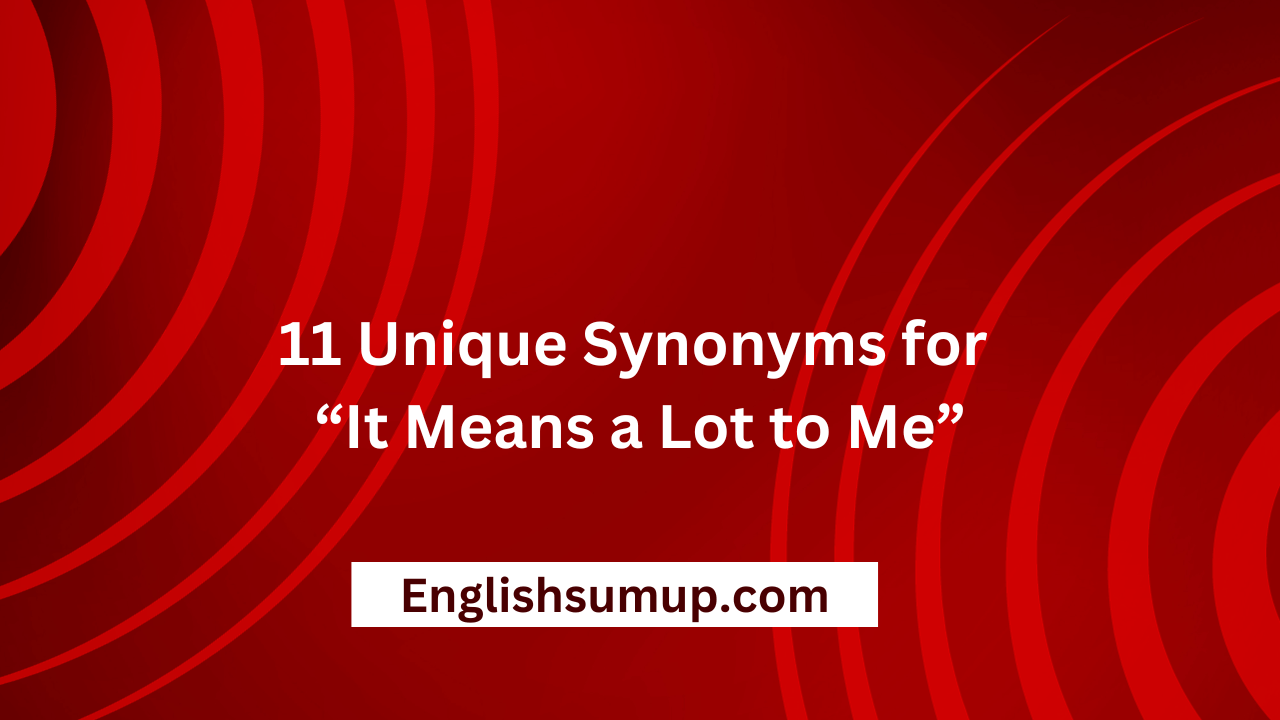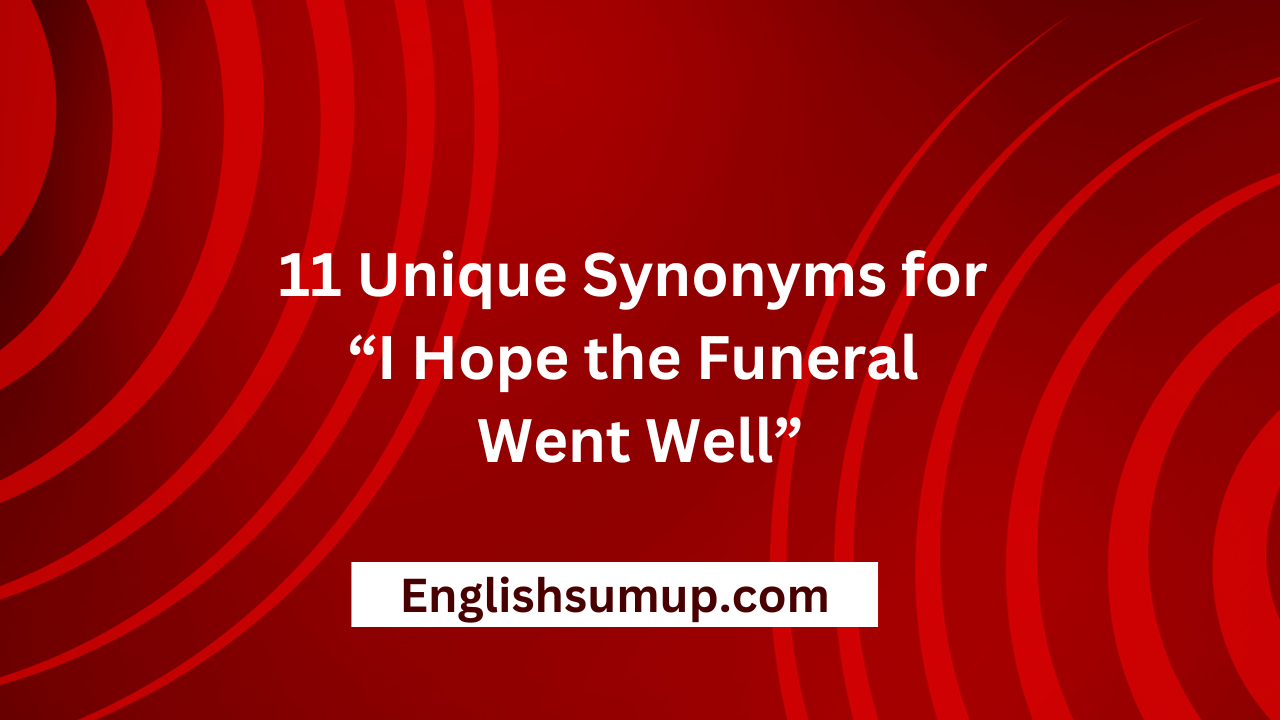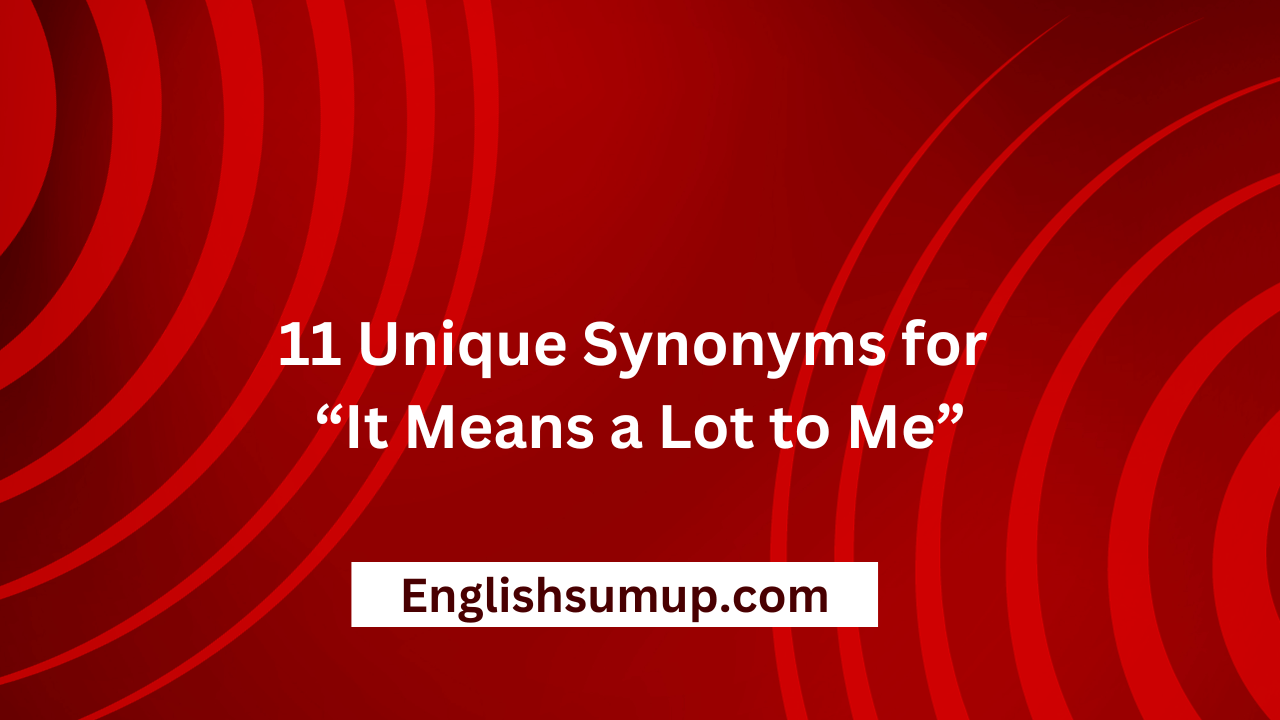In formal correspondence, expressing the significance of something to you may require a more polished approach than a straightforward “it means a lot to me.”
The concern often lies in striking the right balance between professionalism and sincerity.
Fortunately, this article compiles a selection of refined synonyms to guide you in articulating the sentiment “it means a lot to me” in a manner that aligns seamlessly with professional communication standards.
Is It Formal to Say “It Means a Lot to Me”?

Expressing the sentiment “it means a lot to me” is not considered formal and is generally deemed unprofessional, making it unsuitable for most email settings.
In professional correspondence, this phrase is often excluded unless a close working relationship with the recipient allows for a more casual tone, and they would appreciate the personal touch.
While informal, the expression is technically correct and finds its place in more personal interactions, such as text messages to friends or loved ones.
It effectively conveys the significance of the words or actions being acknowledged. For instance:
“Thank you for being there for me, Jack. It means a lot to me, and I hope we can find a way to move forward with this.”
Pros:
Caring Tone: The phrase conveys a genuine and caring sentiment.
Suitable for Personal Messages: It works well in text messages to friends or loved ones.
Cons:
Overly Familiar: The expression may be perceived as overly familiar and is not suitable for formal communication.
Limited Use in Emails: It is generally inappropriate for emails unless a strong relationship with the recipient already exists.
Read this post also: 11 Synonyms for “Please Disregard My Previous Email”
While “it means a lot to me” may not be the ideal choice for formal communication, alternatives exist to help diversify your language. Explore further to discover more suitable phrases to replace “it means a lot to me” in various professional contexts.
What to Say Instead of “It Means a Lot to Me”

- It bears great significance for me.
- It is of substantial importance in my eyes.
- It holds immense value for me.
- I genuinely appreciate your thoughtful actions.
- Thank you so much for what you’ve accomplished.
- It resonates with deep meaning for me.
- It ranks of utmost importance in my estimation.
- I truly appreciate your unwavering support.
- Thanks for being there for me when I needed it.
- Your vigilance on my behalf is sincerely appreciated.
- It genuinely means a great deal to me.
1. It bears great significance for me:
This phrase emphasizes the considerable importance of the subject matter, suggesting that it holds a significant and meaningful place in the speaker’s life. It conveys a depth of value and personal meaning, reflecting the weight of the significance. Isn’t this better than “It Means a Lot to Me”.
Sub: Acknowledging the Significance
Dear John,
I trust this message finds you well. I wanted to express how much the [subject matter] bears great significance for me. It goes beyond mere importance; it holds a deep and meaningful place in my life.
Your understanding and support in this matter are truly appreciated.
Best regards,
Devon
2. It is of substantial importance in my eyes:
By stating that something is of substantial importance, this expression underscores the considerable significance attributed to it by the speaker. The use of “in my eyes” adds a personal touch, indicating that the assessment of importance is subjective and individual. Isn’t this better than “It Means a Lot to Me”.
Sub: Recognition of Importance
Dear John,
I hope this email finds you in good spirits. I wanted to convey that the [subject matter] is of substantial importance in my eyes. Its significance goes beyond the surface, and I value it deeply.
Your involvement in this matter is truly valued.
Warm regards,
Devon
3. It holds immense value for me:
This phrase conveys a sense of magnitude and importance, suggesting that the subject matter possesses considerable worth in the speaker’s eyes. The use of “immense value” emphasizes the depth of appreciation and the profound impact it has. Isn’t this better than “It Means a Lot to Me”.
Sub: Expressing Gratitude
Dear John,
I trust you’re doing well. I wanted to take a moment to express my gratitude. The subject matter holds immense value for me, and your contribution to it is truly appreciated.
Thank you sincerely,
Devon
4. I genuinely appreciate your thoughtful actions:
Here, the focus shifts from the importance of the subject matter to expressing sincere appreciation for someone’s thoughtful actions. It conveys genuine gratitude, acknowledging the impact of the actions and emphasizing the authenticity of the speaker’s appreciation. Isn’t this better than “It Means a Lot to Me”.
Sub: Appreciation for Your Thoughtfulness
Dear John,
I hope this message finds you in good spirits. I want to express my genuine appreciation for your thoughtful actions. Your efforts have not gone unnoticed, and they mean a lot to me.
Thank you sincerely,
Devon
5. Thank you so much for what you’ve accomplished:
This expression directly expresses gratitude for specific accomplishments. It recognizes the efforts and achievements of the recipient, thanking them with sincerity. The phrase “thank you so much” adds emphasis to the level of appreciation. Isn’t this better than “It Means a Lot to Me”.
Sub: Gratitude for Your Achievements
Dear John,
I trust this email finds you well. I want to extend my heartfelt gratitude for what you’ve accomplished. Your achievements have not only made a difference but have deeply impacted me.
Thank you so much,
Devon
6. It resonates with deep meaning for me:
This phrase suggests a profound connection or resonance with the subject matter. It goes beyond mere significance, indicating a personal and emotional connection that elicits deep meaning. The use of “resonates” implies a harmonious alignment with the speaker’s values or sentiments. Isn’t this better than “It Means a Lot to Me”.
Sub: Shared Meaning
Dear John,
I hope this message finds you well. I wanted to convey that the [subject matter] resonates with deep meaning for me. It goes beyond words, and I wanted you to know how much it means.
Your understanding is truly valued.
Best regards,
Devon
7. It ranks of utmost importance in my estimation:
By stating that something ranks of utmost importance, this expression conveys a high level of priority and significance. It reflects the speaker’s estimation or judgment of the subject matter, emphasizing its paramount status in their considerations. Isn’t this better than “It Means a Lot to Me”.
Sub: Recognizing Utmost Importance
Dear John,
I trust this email finds you well. I wanted to recognize that the matter you want to talk ranks of utmost importance in my estimation. Its significance is paramount, and I appreciate your understanding of its weight.
Best regards,
Devon
8. I truly appreciate your unwavering support:
Focusing on the support received from someone, this expression communicates genuine appreciation for their unwavering commitment. The use of “truly appreciate” underscores the authenticity of the speaker’s gratitude, highlighting the enduring nature of the support. Isn’t this better than “It Means a Lot to Me”.
Sub: Grateful for Your Support
Dear John,
I hope this email finds you in good health. I want to express that I truly appreciate your unwavering support. Your commitment has been a source of strength for me.
Thank you sincerely,
Devon
9. Thanks for being there for me when I needed it:
This expression directly acknowledges someone’s presence and support during a time of need. It combines gratitude with the acknowledgment of timely assistance, recognizing the significance of their presence and the impact it had on the speaker. Isn’t this better than “It Means a Lot to Me”.
Sub: Gratitude for Your Presence
Dear John,
I trust this message finds you well. I wanted to express my gratitude for your unwavering presence when I needed it most. Your support has been invaluable, and I appreciate it deeply.
Best regards,
Devon
10. Your vigilance on my behalf is sincerely appreciated:
Centered on someone’s vigilance or watchfulness on the speaker’s behalf, this phrase expresses sincere appreciation. It acknowledges the proactive efforts made by the recipient, indicating that their attentiveness is recognized and valued. Isn’t this better than “It Means a Lot to Me”.
Sub: Recognition of Vigilance
Dear John,
I hope this email finds you in good health. I wanted to convey my sincere appreciation for your vigilance on my behalf. Your attentiveness has not gone unnoticed and is genuinely valued.
Best regards,
Devon
11. It genuinely means a great deal to me:
Similar to the initial phrase, this expression reinforces the profound impact of the subject matter. The use of “genuinely” emphasizes the authenticity of the sentiment, underscoring that it truly holds substantial importance and emotional significance for the speaker. Isn’t this better than “It Means a Lot to Me”.
Sub: Heartfelt Appreciation
Dear John,
I trust this message finds you well. I wanted to convey that the [subject matter] genuinely means a great deal to me. Your involvement has not only been noticed but has deeply touched me.
Thank you sincerely,
Devon
Conclusion
In our exploration of diverse expressions, it becomes evident that finding alternatives to the phrase “It Means a Lot to Me” is a valuable endeavor in effective communication.
These meticulously crafted email templates showcase various ways to convey gratitude, significance, and appreciation.
By incorporating these alternatives, individuals can enrich their expressions and create a more nuanced dialogue, ultimately fostering a deeper connection with those they correspond with.
The art of selecting the right words, beyond a simple “It Means a Lot to Me,” adds depth and sincerity to our communication, enhancing the overall impact of our expressions.










